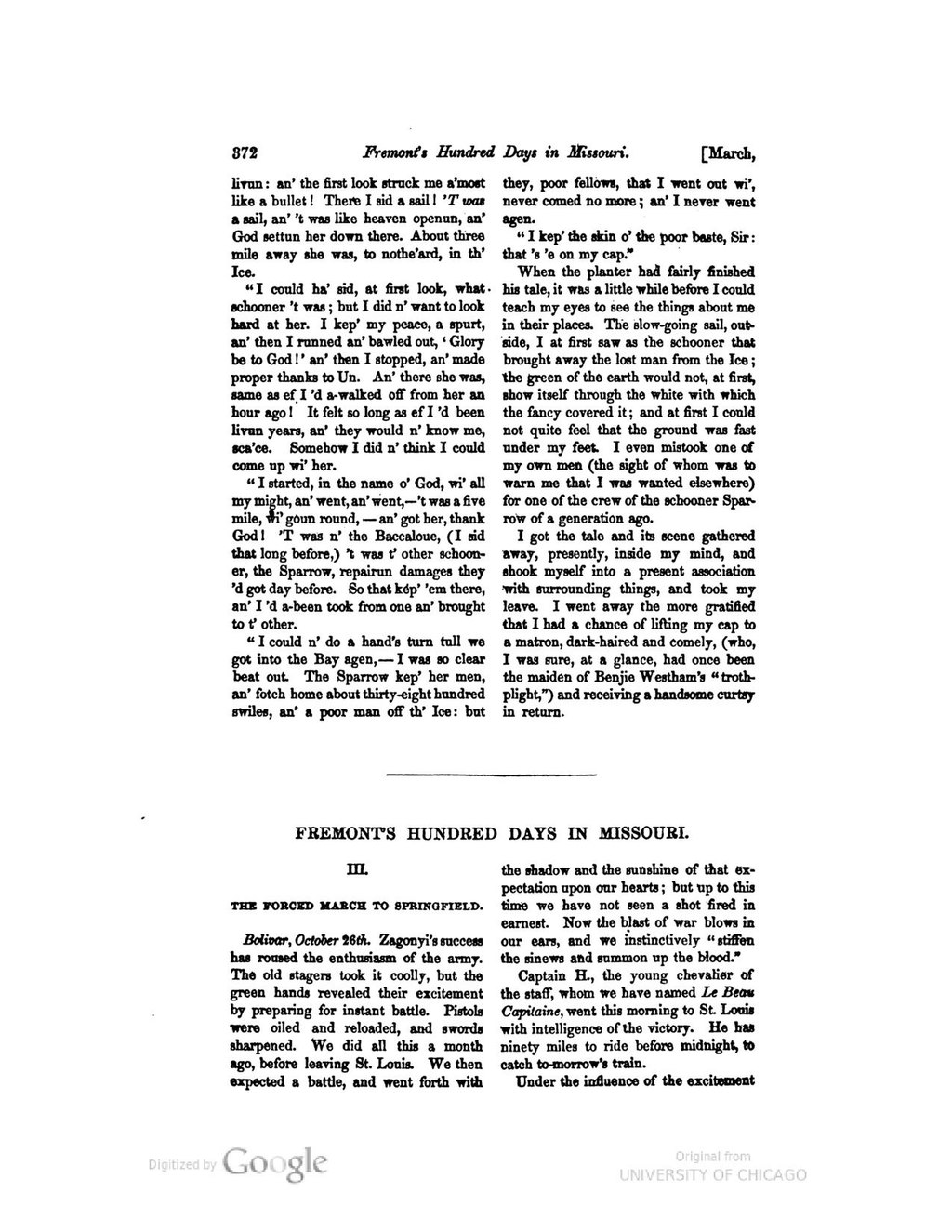livun: an' the first look struck me a'moet like a bullet! There I sid a sail! There a sail, an' 't was like heaven Openun, an' God settun her down there. About three mile away she was, to nothe'ard, in th' Ice.
"I could ha' sid, at first look, what schooner 't was; but I did n' want to look hard at her. I kep' my peace, a spurt, an' then I runned an' bawled out, 'Glory be to God!' an' then I stopped, an' made proper thanks to Un. An' there she was, same as ef I 'd a-walked of from her an hour ago! It felt so long as ef I 'd been livun years, an' they would n' know me, sca'ce. Somehow I did n' think I could come up wi' her.
"I started, in the name o' God, wi' all my might, an' went, an' went—'t was a five mile, wi' goun round,—an' got her, thank God! 'T was n' the Baccaloue, (I sid that long before,) 't was t' other schooner, the Sparrow, repairun damages they 'd got day before. So that kep' 'em there, an' I 'd a-been took from one an' brought to t' other.
"I could n' do a hand's turn tull we got into the Bay agen,—I was so clear beat out. The Sparrow kep' her man, an' fotch home about thirty-eight hundred swiles, an' a poor man off th' Ice: but they, poor fellows, that I went out wi', never comed no more; an' I never went agen.
"I kep' the skin o' the poor baste, Sir: that 's 'e on my cap."
When the planter had fairly finished his tale, it was a little while before I could teach my eyes to see the things about me in their places. The slow-going sail, outside, I at first saw as the schooner that brought away the lost man from the Ice; the green of the earth would not, at first, show itself through the white with which the fancy covered it; and at first I could not quite feel that the ground was fast under my feet. I even mistook one of my own men (the sight of whom was to warn me that I was wanted elsewhere) for one of the crew of the schooner Sparrow of a generation ago.
I got the tale and its scene gathered away, presently, inside my mind, and shook myself into a present association with surrounding things, and took my leave. I went away the more gratified that I had a chance of lifting my cap to a matron, dark-haired and comely, (who, I was sure, at a glance, had once been the maiden of Benjie Westham's "troth-plight,") and receiving a handsome curtsy in return.
FREMONT'S HUNDRED DAYS IN MISSOURI.
III.
the forced march to springfield.
Bolivar, October 26th. Zagonyi's success has roused the enthusiasm of the army. The old stagers took it coolly, but the green hands revealed their excitement by preparing for instant battle. Pistols were oiled and reloaded, and swords sharpened. We did all this a month ago, before leaving St. Louis. We then expected a battle, and went forth with the shadow and the sunshine of that expectation upon our hearts; but up to this time we have not seen a shot fired in earnest. Now the blast of war blows in our ears, and we instinctively "stiffen the sinews and summon up the blood."
Captain H., the young Chevalier of the staff, whom we have named Le Beau Capitaine, went this morning to St. Louis with intelligence of the victory. He has ninety miles to ride before midnight, to catch to-morrow's train.
Under the influence of the excitement The
